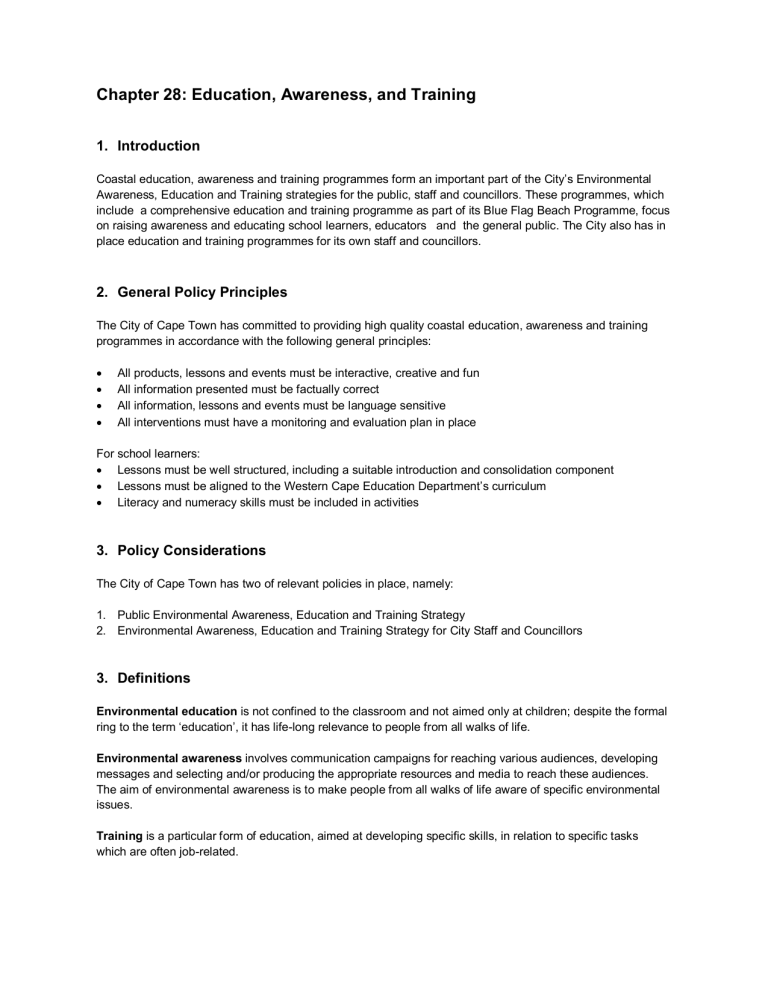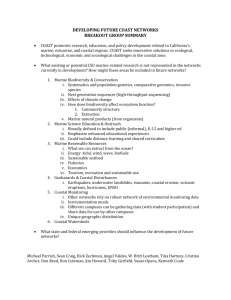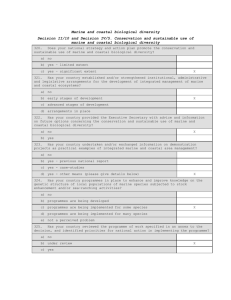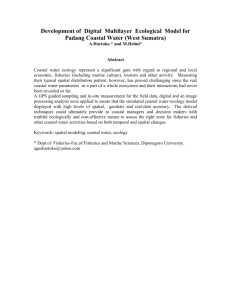Chapter 28: Education, Awareness, and Training 1. Introduction

Chapter 28: Education, Awareness, and Training
1. Introduction
Coastal education, awareness and training programmes form an important part of the City’s Environmental
Awareness, Education and Training strategies for the public, staff and councillors. These programmes, which include a comprehensive education and training programme as part of its Blue Flag Beach Programme, focus on raising awareness and educating school learners, educators and the general public. The City also has in place education and training programmes for its own staff and councillors.
2. General Policy Principles
The City of Cape Town has committed to providing high quality coastal education, awareness and training programmes in accordance with the following general principles:
All products, lessons and events must be interactive, creative and fun
All information presented must be factually correct
All information, lessons and events must be language sensitive
All interventions must have a monitoring and evaluation plan in place
For school learners:
Lessons must be well structured, including a suitable introduction and consolidation component
Lessons must be aligned to the Western Cape Education Department’s curriculum
Literacy and numeracy skills must be included in activities
3. Policy Considerations
The City of Cape Town has two of relevant policies in place, namely:
1. Public Environmental Awareness, Education and Training Strategy
2. Environmental Awareness, Education and Training Strategy for City Staff and Councillors
3. Definitions
Environmental education is not confined to the classroom and not aimed only at children; despite the formal ring to the term ‘education’, it has life-long relevance to people from all walks of life.
Environmental awareness involves communication campaigns for reaching various audiences, developing messages and selecting and/or producing the appropriate resources and media to reach these audiences.
The aim of environmental awareness is to make people from all walks of life aware of specific environmental issues.
Training is a particular form of education, aimed at developing specific skills, in relation to specific tasks which are often job-related.
4. Programme details
Three categories of programmes are run as part of the City’s overall coastal environmental education and training strategy:
Learner education and awareness programmes
Educator education, awareness and training programmes
Staff education, awareness and training programmes
4.1 Learner education programmes
This programme forms part of the City’s Youth Environmental Schools (YES) programme, a general environmental education programme which is centred around various environmental commemorative days and weeks.
The coastal education programme is centred around Marine Week in October. The programme is particularly focused on learners from vulnerable communities, especially those close to the coastline. The timing of
Marine Week in October offers the opportunity for City staff to engage with learners before the summer holiday season.
Coastal education and awareness programmes offered as part of the YES programme include:
General beach and water safety and awareness
Shark safety and awareness
Coastal and marine ecosystems and the food web
Responsible tourism
Coastal and marine pollution and pollution prevention
Blue Flag beach awareness
The Blue Flag EE programme is annually hosted during the Blue Flag season starting on the 1 st
of December and ending 30 th
of March. The focus of the programme is on beach eco systems, waste and pollution, water safety, responsible tourism and general Blue Flag and environmental awareness.
In addition to the Marine Week and Blue Flag EE programme, a comprehensive nature reserve based programme is in place at the City’s coastal nature reserves e.g. the Blaauwberg Nature Reserve, Wolfgat
Nature Reserve and Witzands Aquifer Reserve This programme focuses on coastal and marine biodiversity and the impact that people can have on these ecosystems.
4.2 Educator training programme
A teacher education and training programme also takes place annually. This programme is aimed at capacitating local educators to conduct their own environmental education and awareness programmes, with coastal management as focus areas. As part of the Blue Flag EE programme educators are trained on how to use Blue Flag beaches as outdoor classrooms.
Focus areas include:
Human impacts on the coastal environment
Climate change and sea level rise
Disaster risk management
Pollution and Waste
Responsible tourism
Coastal and Marine eco-systems
Resource use
4.3 Staff education and training
Staff education and training programmes focus on:
Developing practical skills, as well as the understanding behind the skills
Recognising and build on trainees’ existing skills
This component forms part of the overall City staff environmental education and training programme as well as workplace skills plan training programme.
Environmental law enforcement and legal compliance have been identified as priority areas that are integral to the competency of staff working in areas concerned with the environment. This includes staff working in the utility services, whose work has a direct or indirect impact on the natural environment.
Training interventions like Environmental Management Inspectors, Fisheries Permitting, Skipper licensing,
Coastal Engineering, basic coastal awareness training courses are also offered to better equip staff for their different roles and functions.
5. Partners
The City of Cape Town works with a number of key external partners to deliver coastal education and awareness programmes. These partners include: The Two Oceans Aquarium, Shark Spotters, Wildlife and
Environmental Society of South Africa (WESSA), Afri-Oceans Conservation Alliance, Save Our Seas, the
Centre for Conservation Education, and the Soetwater environmental centre, Western Province Lifesavers.
Additionally, a number of different line departments contribute to the City’s coastal education and training programme, including: Environmental Resource Management, Sports, Recreation and Amenities, Solid
Waste, Water and Sanitation and Tourism
6. Roles and Responsibilities
The Environmental Resource Management Department is responsible for the overall management and coordination of the City’s coastal education and awareness programmes as well as the Blue Flag EE and
Information programme. ERMD works in conjunction with its internal City partners and external partners to deliver high quality coastal education, awareness and training interventions.
In order to ensure consistency and accuracy of messaging, internal and external partners wishing to launch new coastal education, awareness and training programmes should first consult with the Environmental
Resource Management Department’s Environmental Capacity Building and Training Unit. This will ensure that the programme is aligned to the City’s environmental education goals and objectives. Partners will remain responsible for the budgeting and management of their own programmes.








